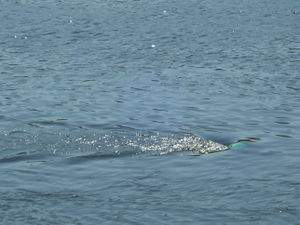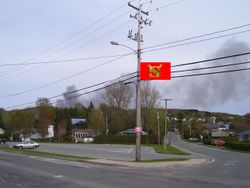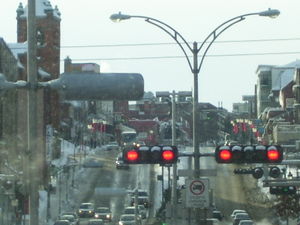Sherbrooke
Ville Sherbrooke
| Motto | Delenda Montréal, now more than ever! |
|---|---|
| Established | 1792 by the Americans, then reclaimed by the French 2 months later |
| Government Type | Democracy |
| Head of Government | Mayor X |
| Location | Quebec, Canada, though often claimed by Ontario as their land |
| Population | a lot (150,000-ish). In French: Un tas de monde |
| Size | varies by season |
| Major Newspaper | La Tribu |
| Anthem | Les Étoiles Filantes by Les Cowboys Fringants |
| Sports Teams | Sherbrooke Hussars |
| Website | [1] |
A city in the Eastern Townships of Quebec, Sherbrooke, also known as Shrekbrooke is a secluded kingdom in a Far Far Away Land, surrounded by the nearby English colonies of Lennoxville, Richmond, and Cookshire, to name a few.
History[edit | edit source]
Sherbrooke was founded immediately after the First American Revolution in 1792. The British loyalists came and established small communities such as North Hatley and Lennoxville in order to have better contact with the queen and king of England. The francophone population of Montreal moved in great numbers to what is now known as Sherbrooke in order to have the lands with the nicest views on the rivers. Over the past decades, French population increased dramatically, and outnumbered the anglophones until they were outnumbered 500 to 1. In 2005, Sherbrooke declared war on Montreal, claiming it was stealing all their youth and not returning them. Montreal launched a nuclear missile on all the ski hills of the Eastern Townships, forcing all touristic operations to come to a halt. Sherbrooke responded by renovating the Hotel-Dieu hospital, thus making them a top-notch high-tech healthy city. At this point it is impossible to determine what the government of Montreal will do next.
Education[edit | edit source]
Sherbrooke is home to many colleges and universities. Despite popular believe that all people living in Quebec's "regions" are uneducated, Sherbrooke has shown (to those watching) that its 12 universities have brought the illiteracy rate to 14%, which is way below the provincial average of 35%.
Universities and Colleges in Sherbrooke
- Bishop's Anglican College (English)
- Bishop's University (English)
- CÉGEP Champlain Lennoxville (English)
- CÉGEP Sherbrooke (French)
- Sherbrooke Adult Education (French)
- Sherbrooke Elementary School for Adults (English)
- Sherbrooke Medical School (French)
- Skiing and Snowboarding University of Mont-Bellevue (French)
- University of Shrek-brooke (French)
- University of Rock Forest (French)
- University of Fleurimont (French)
- Université des Régions à Sherbrooke (French)
Transportation Infrastructure[edit | edit source]
Sherbrooke has an airport located nearly 15 minutes east of downtown. It currently operates a regular scheduled flight service to Toronto, Western Townships on Townships Airlines. Flights fill quickly as the number of seats aboard these miniature planes is limited to the number of fingers on a hand. Tickets cost 348$ one-way, though I may have omitted a zero or two.
Currently no train service serves the Sherbrooke region. A very effective bus service however connects the city with Montreal, which provides wireless Internet aboard, along with five-course meals and private lounges for business meetings. Autoroutes 10 and 55 lead into the city, but in recent years many overpasses have collapsed onto them, forcing closure of these expressways for weeks at a time.
The city of Sherbrooke is served by a well-established system of bike trails and funiculars. The funiculars are there to aid cyclists reach neighbourhoods impossible to get to, due to high elevation in many parts of Sherbrooke. Ski lifts are also used in downtown to bring commuters from the riverside trails to the business offices on King Street. As of 2006. Sherbrooke is experimenting with the first bus service in the history of the Eastern Townships.
Climate[edit | edit source]
Due to its mountainous terrain, Sherbrooke experiences a different type of climate then most lowland cities in Canada would. Daytime temperatures vary from 21°C in July, to -9°C in January. Night time temperatures however barely climb above freezing point, and this year-round. Precipitation is abundant 12 months a year, ranging from snow in the winter, to sleet and ice pellets in the summer. Rain occasionally does fall in the summer months, but this is due to a British-oriented culture established in the area since the First American Revolution of 1792.


